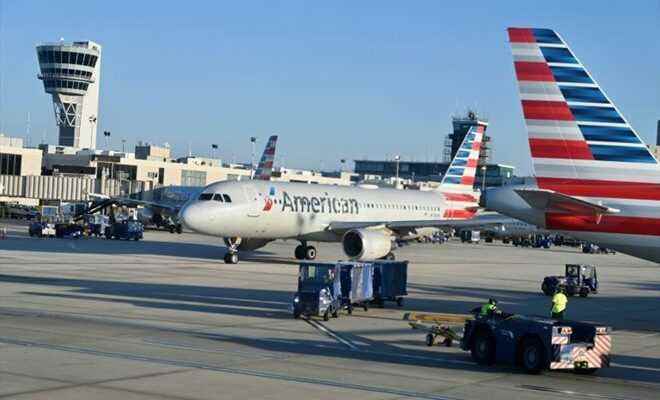American Airlines planes at Philadelphia International Airport, United States, June 20, 2022 (AFP/Daniel SLIM)
Boosted by inflation, the prices of plane tickets have started to rise again after two years of pandemic depression, a trend that is likely to increase in the long term, under environmental and regulatory pressure.
For the participants of the International Air Transport Association (Iata), meeting at the annual general meeting in Doha, Qatar this week, the question will be whether this increase in prices will have consequences on access to this mode of transport, and to its ambitious growth plans despite the climate crisis.
The airline world has just gone through two years of planes flying partly empty and fares relatively low compared to the pre-Covid period.
But with most travel restrictions lifted, that period of bonanza for travelers is over. And the trend is clear whatever the destinations and dates.
– “No reduction in demand” –
In the United States, the average price of a domestic trip has exploded in six months, from 202 dollars in October 2021 to 336 dollars in May 2022, according to statistics from the branch of the Federal Reserve of Saint Louis.
In the European Union, the average price excluding taxes of a one-way ticket returned in April to the level of the same month of 2019, after having fallen by more than 20% in 2020, according to data from Cirium, a specialist company. in the study of the sector.
And in France, the prices of flights departing from the territory, for all types of journeys, increased by 19.4% in May compared to the same month of 2021, according to the Directorate General of Civil Aviation.
The causes of this increase are known: demand reinvigorated faster than expected, supply still constrained by organizational difficulties and labor shortages, unprecedented inflation for 40 years, fueled in particular by an oil shock accentuated by the Russia’s invasion of Ukraine…
Airlines expect to spend 24% of their costs on fuel this year, compared to 19% in 2021. And, as they have to rebuild their cash drained by the health crisis, they are forced to transfer these increases to customers.
However, “we don’t see a reduction in demand, and I don’t think we will see any,” assures the general manager of the American giant United Airlines, Scott Kirby, putting the current increases in perspective: “in real terms, prices are back to 2014 levels, and lower than before that time.”
– End of democratization? –
“The trips that are currently taking place are the result of government stimulus plans, which have become disposable income” for individuals, notes Vik Krishnan, partner at McKinsey and air specialist.
“The first item of discretionary spending is travel, and that’s what people do. It remains to be seen how long it will last,” he wonders.
Beyond these challenges, hangs over air transport a sword of Damocles: the need to no longer contribute to global warming by 2050, as it has committed to, while transporting 10 billion people a year against 4.5 billion in 2019.
To decarbonise, companies rely two-thirds on sustainable aviation fuels (SAFs) which are currently two to four times more expensive than fossil-based kerosene. Some governments are beginning to make it compulsory to incorporate them in small quantities, which has already forced companies to impose surcharges.
On Tuesday, Iata urged subsidizing SAF production to achieve 30 billion liters available in 2030 from 125 million in 2021, obsessed with driving down prices.
The total cost of the transition to “net zero emissions”? According to Iata, 1.550 billion dollars over 30 years. “The companies will not be able to absorb these cost increases (…), the transition will have to be passed on to ticket prices, and this could slow down part of the growth”, conceded on Tuesday the director general of the organization, Willie Walsh.
What can reverse the long-standing trend to democratize the sector? For Mr. Krishnan, in fact, “democratization will be more difficult to obtain”. But “it will be very complicated for governments to go back” on the access of the greatest number to air travel, he warns.
© 2022 AFP
Did you like this article ? Share it with your friends with the buttons below.




